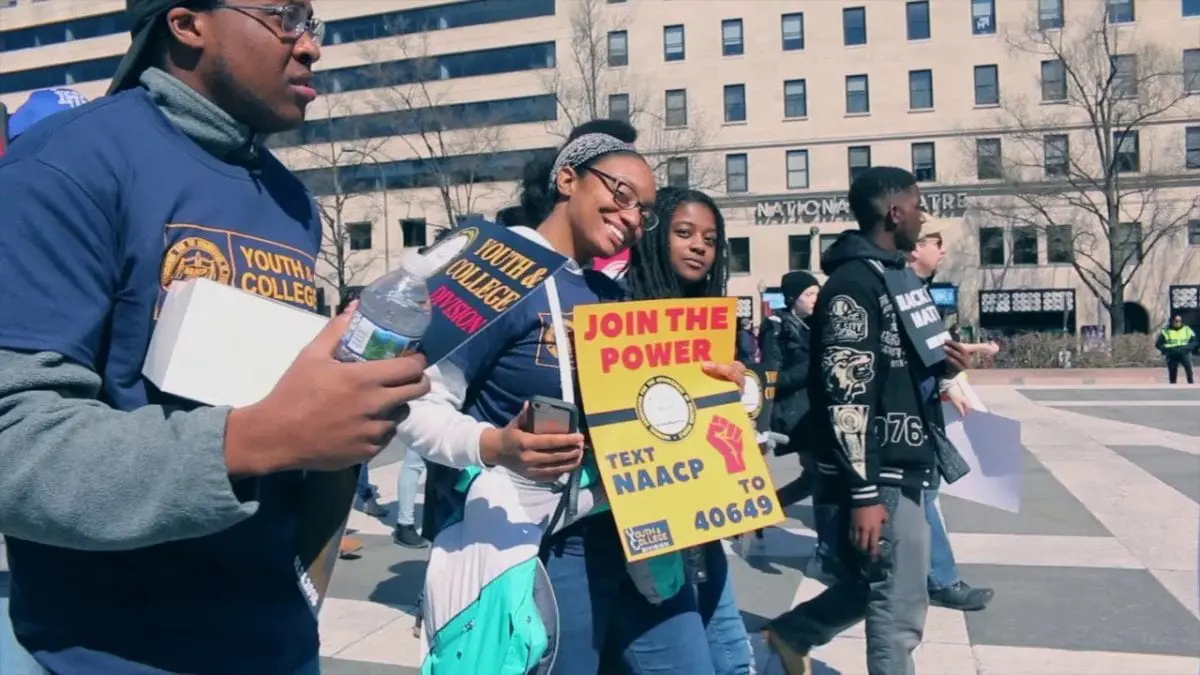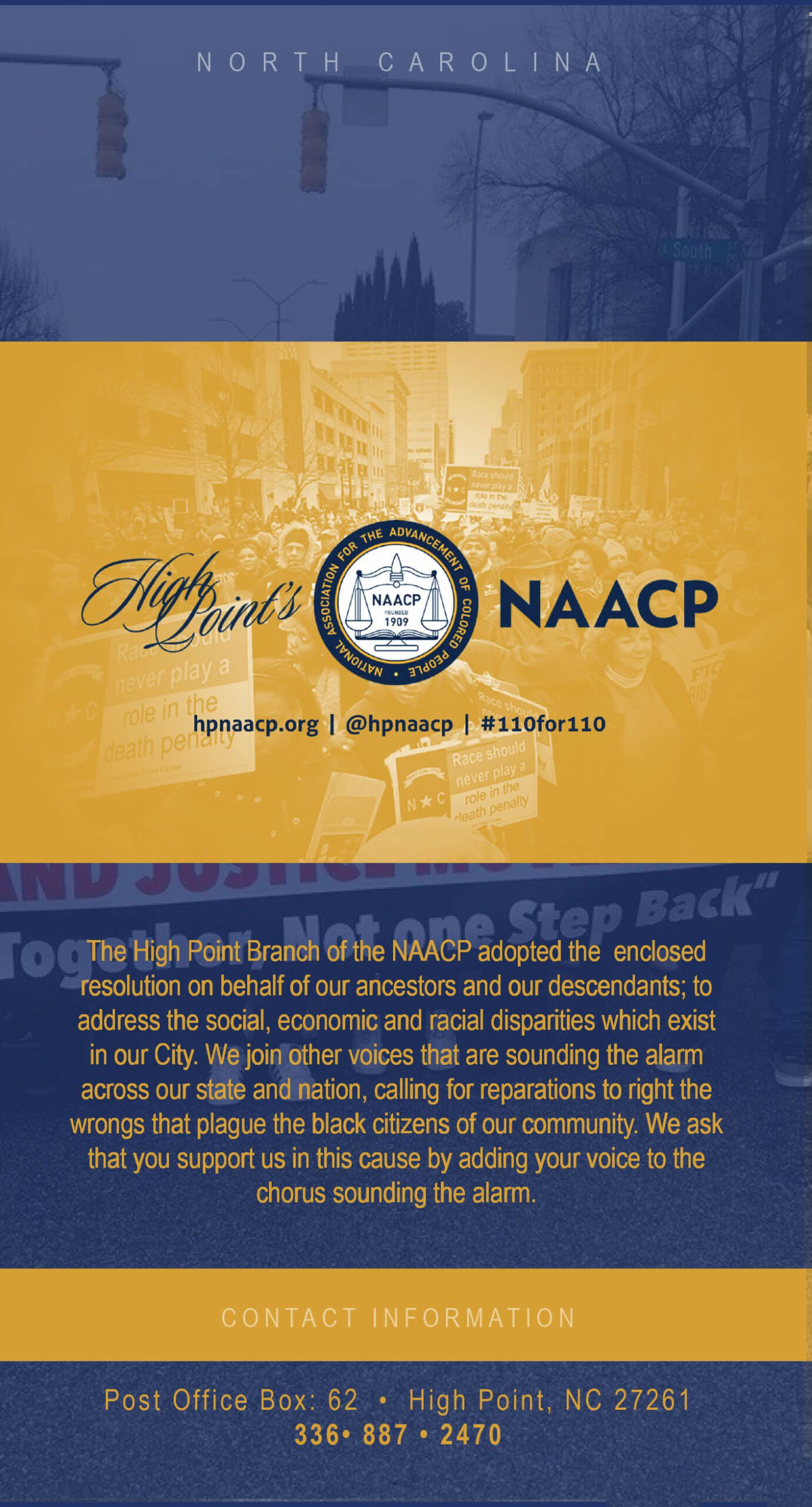High Point Now has a Reparations Commission, With the Passing of the Resolution Establishing the “One High Point Commission”
Monday February 7, 2022
Resolution Passes
A RESOLUTION FOR THE ONE HIGH POINT COMMISSION TO EXPLORE COMMUNITY REPARATIONS FOR THE AFRICAN AMERICAN CITIZENS OF HIGH POINT, NORTH CAROLINA
Monday May 2, 2022
Commission Seated
High Point City Council approved 13 Members to make up the One High Point Commission. The work begins now! Check back here and Join Our Newsletter to stay informed.

Our reparations committee has presented High Point’s City Council with a Resolution to establish a reparations commission

here’s how you can help
If you care about fighting the racial disparities that are still too prevalent in America, the NAACP is the place where you can make a difference.
FIGHTING FOR CIVIL RIGHTS WITH THE NEXT GENERATION
Register and come to the Virtual Town Hall.
Hidden
Write a letter to your city council member.
Date:
The Honorable (Fill in council person’s name)
High Point City Council
RE: High Point City Commission on Reparations
Dear (Councilman):
As a citizen of High Point, I ask that you vote YES for a reparations commission for the Black citizens of High Point. The Commission will consider an apology for wrongs of the past and explore reparations to pave the way for equity for African-Americans in High Point.
How can we be North Carolina’s international city without accounting for High Point’s legacy of slavery and Jim Crow? How can High Point represent itself as a progressive city of the future when its African-American citizens continue to suffer the consequences of historic discrimination? African-Americans have contributed significantly to the building of this city and the United States of America without due and fair compensation and recognition. They have been and continue to be left out of opportunities for wealth.
High Point is on the cusp of being recognized as an international city. A commission on reparations begins a long overdue reconciliation between a dark past and a bright future. Reparations and Truth and Reconciliation Commissions have been used all over the world to help citizens heal and repair historic trauma. Vote YES on September 20th! Our future depends on it.
Sincerely,
SIGN YOUR NAME
Print your name
Street address
City, State, Zip Code
Help us spread the word!
Forward this information to other High Pointers who may not yet have all the information and help them join this effort. Download the flyer and forward it. Share this page on your social media as well, it’s always up to date.
Send us your questions or comments.
Donate to the Reparations Campaign
Reparations
Acknowledgement of assault against humanity
Our Story
Black people endured murder, rape, sodomy, crimes against nature, and assault against educational, financial, and economic sustainability
Who Bears Responsibility?
Descendants of the perpetrators who must publicly apologize and “do the right thing”
Who Are the Recipients?
Descendants against whom atrocities were leveled must receive restitution
Reparations = Restitution
What Restitution is: the redistribution of tangible resources that make up for the 244-year head start in the building and transference of generational wealth
What Restitution is
- Housing solutions, home ownership, and expanding grant opportunities
- Elimination of food deserts
Education that supports a living wage - Equal opportunity in contracting with the City
What Restitution is
- Review Police department funding to ensure equity in treatment
- Access to healthcare
- Investment in the Black community to ensure safety and economic well-being
What Restitution is not
- Social Programs
- Affirmative Action
- Reversing harmful policies without providing compensation for their effects
How is Restitution Determined?
How is Restitution Determined and How Do We Bring Closure?
- One High Point Commission on Reparations
- Recommendations submitted to Council for implementation
A RESOLUTION FOR THE CREATION OF A CITY COMMISSION TO EXPLORE COMMUNITY REPARATIONS FOR THE AFRICAN AMERICAN CITIZENS OF HIGH POINT, NORTH CAROLINA
Section 1. Summary.
The City of High Point is positioned for a call to action to join other municipalities around the state and country which have taken on the charge of seeking remedies for the long-suffering of black people. This Resolution, presented on behalf of the African American citizens of High Point, seeks to address the fundamental injustice, cruelty, brutality, and inhumanity of slavery in High Point, North Carolina between 1750 and 1865 and to establish a commission to study and consider a municipal apology and proposal for reparations for the institution of slavery, its subsequent de jure and de facto racial and economic discrimination against African-Americans, and the impact of these forces on living African-Americans, to make recommendations to the City on appropriate remedies, and for other purposes.
Section 2. Findings and Purpose.
(A) Findings.—The African American citizens of High Point find that—
(1) approximately 4,000,000 Africans and their descendants were enslaved in the United States and colonies that became the United States from 1619 to 1865 and in 1850 the State of North Carolina had 288,548 enslaved persons;
(2) the institution of slavery was constitutionally and statutorily sanctioned by the Government of the United States and the State of North Carolina from 1789 through 1865;
(3) the slavery that flourished in the United States, the State of North Carolina, and the City of High Point constituted an immoral and inhumane deprivation of Africans’ life, liberty, African citizenship rights, and cultural heritage, and denied them the fruits of their own labor;
(4) a preponderance of scholarly, legal, community evidentiary documentation and popular culture markers constitute the basis for inquiry into the on-going effects of the institution of slavery and its legacy of persistent systemic structures of discrimination on living African-Americans and society in the United States, the State of North Carolina, and the City of High Point; and
(5) following the abolition of slavery the governments of the United States, the State of North Carolina, and the City of High Point, continued to perpetuate, condone and often profit from practices that continued to brutalize and disadvantage African-Americans, including share cropping, convict leasing, Jim Crow, redlining, unequal education, and disproportionate treatment at the hands of the criminal justice system; and
(6) as a result of the historic and continued discrimination, African-Americans in the City of High Point continue to suffer debilitating economic, educational, and health hardships including but not limited to having nearly 1,000,000 black people incarcerated; an unemployment rate more than twice the current white unemployment rate; and an average of less than 1⁄16 of the wealth of white families, a disparity which has worsened, not improved over time.
(B) Purpose.—The purpose of this Resolution is to establish a commission to study and develop Reparation proposals for African-Americans as a result of—
(1) the institution of slavery, including both the Trans-Atlantic and the domestic “trade” which existed from 1565 in colonial Florida and from 1619 through 1865 within the other colonies that became the United States, and which included the Federal government, the State of North Carolina, and the City of High Point, which constitutionally and statutorily supported the institution of slavery;
(2) the de jure and de facto discrimination against freed slaves and their descendants from the end of the Civil War to the present, including economic, political, educational, and social discrimination, in which the City of High Point is complicit;
(3) the lingering negative effects of the institution of slavery and the discrimination described in paragraphs (1) and (2) on living African-Americans, especially the African American citizens of High Point;
(4) the manner in which textual and digital instructional resources and technologies are being used to deny the inhumanity of slavery and the crime against humanity of people of African descent in the public schools, colleges and public institutions in the City of High Point;
(5) the direct benefits to societal institutions, public and private, including higher education, corporations, religious and associational in the City of High Point;
(6) and thus, recommend appropriate ways to educate the Citizens of High Point of the Commission’s findings;
(7) and thus, recommend appropriate remedies in consideration of the Commission’s findings on the matters described in paragraphs (1), (2), (3), (4), (5), and (6); and
(8) submit to the City of High Point the results of such examination, together with such recommendations.
Section 3. The Resolution.
BE IT RESOLVED THAT –
(A) Establishment.—There is established the Commission to Study and Develop Reparation Proposals for African-Americans (hereinafter in this Resolution referred to as the “Commission”).
(B) Duties.—The Commission shall perform the following duties:
(1) Identify, compile and synthesize the relevant corpus of evidentiary documentation of the institution of slavery in the State of North Carolina and the City of High Point, which existed from 1750 through 1865. The Commission’s documentation and examination shall include but not be limited to the facts related to—
(a) the capture and procurement of Africans for slavery in the State of North Carolina and the City of High Point;
(b) the sale and acquisition of Africans as chattel property in interstate and intrastate commerce as it pertains to slavery in the State of North Carolina and the City of High Point;
(c) the treatment of African slaves in the State of North Carolina and the City of High Point, including the deprivation of their freedom, exploitation of their labor, and destruction of their culture, language, religion, and families; and
(d) the extensive denial of humanity, sexual abuse and the chatellization of persons in the State of North Carolina and the City of High Point;
(2) The role which the State of North Carolina and the City of High Point supported the institution of slavery in constitutional and statutory provisions, including the extent to which such governments prevented, opposed, or restricted efforts of formerly enslaved Africans and their descendants to repatriate to their homeland.
(3) The State of North Carolina laws and those of the City of High Point that discriminated against formerly enslaved Africans and their descendants who were deemed United States citizens from 1868 to the present.
(4) In the State of North Carolina and the City of High Point the other forms of discrimination in the public and private sectors against freed African slaves and their descendants who were deemed United States citizens from 1868 to the present, including redlining, educational funding discrepancies, and predatory financial practices.
(5) The lingering negative effects of the institution of slavery and the matters described in paragraphs (1), (2), (3), (4), (5), and (6) on living African-Americans in the City of High Point.
(6) Recommend appropriate ways to educate the Citizens of High Point of the Commission’s findings.
(7) Recommend appropriate remedies in consideration of the Commission’s findings on the matters described in paragraphs (1), (2), (3), (4), (5), and (6). In making such recommendations, the Commission shall address among other issues, the following questions:
(a) How such recommendations comport with international standards of remedy for wrongs and injuries caused by the State and City, that include full reparations and special measures, as understood by various relevant international protocols, laws, and findings.
(b) How the City of High Point will offer a formal apology on behalf of the African American citizens for the perpetration of gross human rights violations and crimes against humanity on African slaves and their descendants.
(c) How High Point City ordinances, laws and policies that continue to disproportionately and negatively affect African-Americans as a group, and those that perpetuate the lingering effects, materially and psycho-social, can be eliminated.
(d) How the injuries resulting from matters described in paragraphs (1), (2), (3), (4), (5), and (6) can be reversed and provide appropriate policies, programs, projects and recommendations for the purpose of reversing the injuries.
(e) How, in consideration of the Commission’s findings, any form of compensation to the descendants of enslaved African can be calculated.
(f) What form of compensation should be awarded, through what instrumentalities and who should be eligible for such compensation.
(g) How, in consideration of the Commission’s findings, any other forms of rehabilitation or restitution to African American citizens of High Point is warranted and what the form and scope of those measures should take.
(C) Report To City Council.—The Commission shall submit a written report of its findings and recommendations to the City of High Point not later than the date which is one year after the date of the first meeting of the Commission.
Section 4. Membership.
(A) Number And Appointment.— (1) The Commission shall be composed of 13 members, who shall be appointed, within 90 days after the date of enactment of this Resolution as follows:
(1) Two members shall be appointed by the Mayor.
(2) Three members shall be appointed by the City Council.
(3) Eight members shall be selected from African American civil rights and civic organizations that have historically championed the cause of justice in the City of High Point.
(4) All members of the Commission shall be persons who are especially qualified to serve on the Commission by virtue of their education, training, activism or experience, particularly in the field of African-American studies and reparatory justice.
(B) Terms.—The term of office for members shall be for the life of the Commission. A vacancy in the Commission shall not affect the powers of the Commission and shall be filled in the same manner in which the original appointment was made.
(C) First Meeting.—The Mayor of the City of High Point shall call the first meeting of the Commission within 120 days after the date of the enactment of this Act or within 30 days after the date on which legislation is enacted making appropriations to carry out this Act, whichever date is later.
(D) Quorum.—Nine (9) members of the Commission shall constitute a quorum, but a lesser number may hold hearings.
(E) Chair And Vice Chair.—The Commission shall elect a Chair and Vice Chair from among its members. The term of office of each shall be for the life of the Commission.
(F) All members of the Commission shall be reimbursed for travel, subsistence, and other necessary expenses incurred by them in the performance of their duties to the extent authorized.
Section 5. Powers of the Commission.
(A) Hearings And Sessions.—The Commission may, for the purpose of carrying out the provisions of this Resolution hold such hearings and sit and act at such times and at such places in the City of High Point, and request the attendance and testimony of such witnesses and the production of such books, records, correspondence, memoranda, papers, and documents, as the Commission considers appropriate.
(B) Powers Of Subcommittees And Members.—Any subcommittee or member of the Commission may, if authorized by the Commission, take any action which the Commission is authorized to take by this section.
(C) Obtaining Official Data.—The Commission may acquire directly from the head of any department, agency, or instrumentality of the City of High Point Government, available information which the Commission considers useful in the discharge of its duties. All departments, agencies, and instrumentalities of the City of High Point Government shall cooperate with the Commission with respect to such information and shall furnish all information requested by the Commission to the extent permitted by law.
Section 6. Administrative Provisions.
(A) Staff.—The High Point City Council may, appoint such personnel as the Commission considers appropriate.
(B) Applicability Of Certain Civil Service Laws.—The staff of the Commission may be appointed without regard to the provisions of the City of High Point’s civil service provisions.
(C) Experts And Consultants.—The Commission may procure the services of experts and consultants.
(D) Administrative Support Services.—The Commission may enter into agreements for procurement of financial and administrative services necessary for the discharge of the duties of the Commission. Payment for such services shall be made by reimbursement from funds of the Commission in such amounts as may be agreed upon by the Chairman of the Commission.
(E) Contracts.—The Commission may—
(1) procure supplies, services, and property by contract in accordance with applicable laws and regulations and to the extent or in such amounts as are provided in appropriations; and
(2) enter into contracts with departments, agencies, and instrumentalities of the City of High Point and the State of North Carolina, private firms, institutions, and agencies, for the conduct of research or surveys, the preparation of reports, and other activities necessary for the discharge of the duties of the Commission, to the extent or in such amounts as are provided in appropriations.
Section 7. Termination.
The Commission shall terminate 90 days after the date on which the Commission submits its report to the Council under section 3(C).
Section 8. Authorization of Appropriation.
To carry out the provisions of this Act, there are authorized to be appropriated $100,000.
Want to Help!
We need your help now! From calling your council member, to helping spread the word…
There’s a lot of work ahead. See how you can take action NOW!









